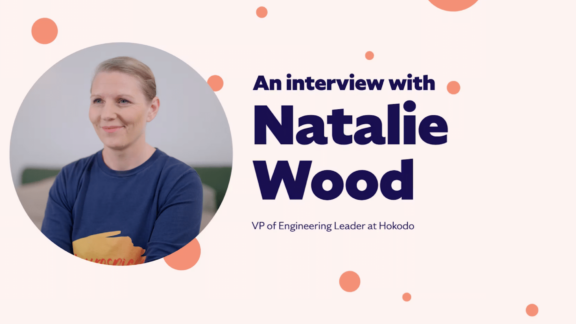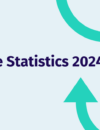Engineering leader and candidate of Druthers, Natalie is passionate about women and disability in technology and actively participates and leads initiatives to introduce and support both in the technology sector. She’s also hugely enthusiastic about raising awareness around neurodiversity.
What’s your background and journey with neurodiversity and autism?
So I am working in the engineering sector, which I’ve been working in for about 20 something years now. I’ve always had a deep interest in neurodiversity in general, but particularly autism for many, many years. I met my husband about 13 years ago, who is autistic and then we went on to have an autistic son. Up until last year, about a year ago now, I thought that I was a neurotypical person, but just one that had a deep understanding of autism because so much of what autistic people talk about resonated with me. And long story short ended up going to an autism conference for women where I met many autistic women and had a light bulb moment where the penny dropped. And having talked through with them their experiences and my experiences, realised I was also autistic which has been quite a journey from the last year I went on to get a formal diagnosis about a month after that. So it was around July last year and it has been a journey from this last year of going through the acceptance and grieving and replaying every single thing in my life that’s happened, but with a very clear understanding now of why certain challenges are prevalent for me and why certain strengths are there as well that I wasn’t quite able to piece all together before. So it’s been amazing to have that clarity. It has presented challenges as well, which I feel like I’m sort of coming through the harder parts of that journey where I can now focus on the accommodations that I need in making the workplace more accommodating for other people who are neurodivergent.
What do you wish more people knew about neurodiversity in the tech sector and are there any myths you’d like to bust or facts you’d like to raise awareness of?
I think working in the tech sector is one of those where there will be quite a high proportion of neurodivergent people. There are lots more than I think people realise and there will be a lot of people who don’t even know themselves yet that they are neurodivergent. So it’s particularly prevalent I would say in that industry. There are lots of myths about autism, and there are so many that I could talk for a long time on this topic. But if I touch on some of the key ones that I think are particularly important. So the first one is around people generally think that autism just affects white boys because a lot of the research that’s been out there about autism for many, many years, which hasn’t been written by autistic people, has focused on research around white boys which has led to lots of late diagnosed or not diagnosed at all, people who are women ethnic minorities, and adults as well. So I meet a huge number of people who have been diagnosed in their forties and fifties. And often it has come from their child being diagnosed and they’ve realised that there are a lot of similarities there. So there will be lots of people that we are all working with that are neurodivergent that as I say, may or may not know themselves. So that’s the first one. The second one is that people have quite a fixed idea about what autism looks like from that research. And one of the myths is that all autistic people have learning difficulties and some autistic people will have learning difficulties, but many autistic people learn incredibly well, right? And depending on what the thing is that they’re learning, and if it’s particularly an area of focus that they’re interested in, we can do very, very deep hyper-focused style learning that allows us to actually take on a huge amount of information and learn very quickly. So I have found sometimes when I’ve talked to people about my diagnosis that they’ve done things like start talking really slowly to me, for example, as if I won’t understand. And it’s quite hard to meet with those kind of biases that are out there. So that’s another one. One of the biggest, and for me probably the most significant myths that really bothers me, is around a lack of empathy. So there’s, quite a lot of research from many, many years ago that talks about, autistic people not really understanding how other people feel and this couldn’t be more incorrect. So most autistic people are actually hyper empathetic. So much so that we take on the feelings and thoughts of others so deeply that it can be quite hard to process that and it can cause people to shut down and withdraw from the conversation, which means that it can come across as though we have a lack of empathy when actually we just don’t really know what to do with the huge amount of feelings that we’re having. And there are lots of pros that come with that as well, but there are cons that come with that.
There’s another myth that autistic people are very antisocial because of the challenges that we can have in social situations, particularly in large groups where at times it can just feel so overwhelming that we may need to leave the situation suddenly or, again shut down or withdraw from the conversations. It can appear that we don’t want to be part of those social interactions, but actually we really crave them. It’s just that they can be quite challenging sometimes. The final myth that I wanted to cover was around talking a little bit around the overstimulation that we have with particularly sight and sounds. So, this is a big problem for many autistic people. It’s a particular problem for me in terms of audio, where it isn’t really about the volume and this is the bit that I wanted to cover. It’s about the inability to filter certain sounds out. So the more different sounds and sites there are at the same time, the more overwhelming it becomes. That’s quite significant when you come to these big social gatherings or you are meeting in a very noisy environment, lots of people around where I can really struggle to focus on the conversation that I’m in because I’m hearing all of the other conversations and all of the other sounds with absolute equal priority. I can’t zone into one particular sound. And that’s a contributing factor for why it might appear that we find social interactions quite difficult in big groups.
What are some of the brilliant individual skills, insights and viewpoints that neurodivergent people will bring to the tech sector?
I think there’s a whole bunch of things that neurodivergent people can do that that other people can’t do. And it’s about trying to marry up the opportunity of those skills that you need with the kinds of people who can do them and creating an environment where it’s easy for them to do those. So if I think about some of the skills that we’ve got there is an ability that we have to consume a huge amount of information, and bring it all together and find patterns in it and be able to, translate it to others in a very simple way. We can go very, very deep and quite broad into a topic as well. And the way that we tend to learn is quite detail oriented, so it’s very bottom up rather than top down. And you might hear terms like, tree learning versus forest learning where a lot of people who are not neurodivergent would look at a forest and just assume, well this is a forest, I don’t need to do any more than that. Whereas a neurodivergent person will tend to learn every single tree in the forest and know all of the details about the trees and then determine at the end, yes, this is a forest. And what that means is that we’re tend to be much less likely to make false assumptions and draw false conclusions from information. So it might take a little bit longer to get there. Generally those assumptions that we are making are very solid. That can be a real strength I think depending on the kind of industry and the kind of work that you’re working on. So that’s the first thing.
The other thing which is kind of related to one of the earlier points is around hyperfocus, where particularly if it’s an area that we’re interested in, not only can we hyperfocus, it’s actually quite hard not to hyperfocus on certain things. So you go very, very deep and focused into a topic to the point where you can forget to eat, go to the toilet, and you can produce a huge amount of work in quite a short amount of time. So sometimes I can hyper-focus for four hours say, and produce what would be a week’s work for somebody else. But it’s exhausting. So you have to be really careful to manage your working day and your time. If you’re not in an environment where you can take that break after you’ve had a period of hyper focus, then you will end up getting burnt out. So it’s again, one of those kind of pros and cons thing. The other thing that I think is really, for me, really valuable about having neurodivergent people is that we are very focused on the truth and honesty and being very authentic. It means that you can rely very heavily on what an autistic person tells you that it will match what they’re really seeing. There’s no sugarcoating, no fluff. It can come across as quite direct. I’ve often been told, I’m quite blunt, throughout my career, but I’m telling it straight. So for me, I love working with other autistic people ’cause you can quite quickly get to the heart of a problem. And that I see as a real strength. Autistic people also are quite deeply creative as well. Again, I think there’s another myth that, that they’re not, and it’s all maths and science degrees but actually there’s a huge number of people who are deeply imaginative and can almost see things that aren’t there, but they’re in their head and translate them in a way that other people can’t and end up with these quite elaborate artwork ormwritten stories and things that I think they’re amazing. Then going back to that high empathy piece, for me that’s one of my biggest strengths is that when I’m organising an event or I’m trying to drive a change, I can very easily put myself in the position of every single person that is impacted by that event or that change, without really trying and go through the change and event from their perspective and end up, with something that people generally find really inclusive and very easy to come on board with and a change that will stick. That’s something that’s been sort of fed back to me quite a few times is that there’s no stone unturned.
Do you think there’s a difference between women with autism and men with autism in that way?
I don’t know if there’s necessarily a difference between men and women. There’s a difference between everybody. Yeah. Right. So there’s certain traits that I have that are nothing to do with being autistic. I’m quite determined about things. I’m quite, firm and bossy at times and those kind of things are nothing to do with being autistic, that’s just me. But there is a huge difference in men and women in terms of how much they tend to mask. Which is why a lot of women tend to get diagnosed a lot later than men. There’s a whole variety of reasons around that, when you’re growing up as a younger woman that there is a little bit more pressure to, socially fit in. it tends to be that the things that women will get interested in are slightly more socially acceptable than some of the things that men might get into who are autistic. We just become really brilliant at masking. So much so that I’d been masking for 45 years and didn’t know that I was actually doing it. I just knew that I was very tired all of the time. That’s all I really knew. It’s only when I got my diagnosis that I had to undo all of that thinking and replaying everything to think about all the times that I had to mask. So it will present differently. And there are things that come with that where, there’s quite a lot of research around, particularly with women, how the facial expressions don’t really match what they’re feeling a lot. And I get this a huge amount of the time, where apparently I look quite grumpy and quite miserable when actually I’m feeling fine. That seems to happen more with women than it does with men, but it’s all down to the masking. So I think that’s the key difference in terms of what you would see outwardly.
How can and should senior leaders be better supporting neurodivergent people in their current teams and what should be their considerations?
So this is a really interesting one. I think about this a lot because what, so I spend a huge amount of my time and I have done for, you know, 20 years or so researching autism because it happens to be one of my special interests. So I know a lot about it and I’ve also then started to research quite a lot about ADHD and other kinds of neurodivergence. I don’t expect everybody else to know the level of detail that I know about but what I do expect and hope for is for people to be open to talking about it and asking. One of the things that I’d love to see more of is just having that open conversation about when we are organising an event for work, or whether we’re talking about our meeting etiquette or any kind of task that we are performing or processes, including recruitment is to actually take a minute to think about are we being inclusive and are we thinking about different brain types as well as other kinds of disabilities, backgrounds, perspectives. And the only way you can really do that without being kind of blindsided by your own experience is just to ask that question openly to people and take a minute to say, what about this would be more inclusive for you? What could we change? What accommodations do you need? It won’t be possible to do them all. And I’m fully aware of that. There are some accommodations I’d love to have, but that I know wouldn’t work for everybody else. Right. And I’m, you shouldn’t accommodate one group of people by, um, disadvantaging another. But there are lots of ways that we can make things inclusive for everybody that are quite simple to do. So for me it’s just about having that conversation with your team, with your direct reports early on when you meet them, because there comes a time where it’s kind of of too late to do that. Right. But it’s one of the first things I’ll do when I meet a new team is I have a series of questions I ask. And one of them is about, tell me about how you work best. What does your ideal working day look like? And for most people, it’s not nine to five or nine to six, it’s, you know, it can be a whole variety of things, and where you can be accommodating to to those things and creating that safe space where people can come forward and ask you for what they need. And because they know that they’ll be heard and that it will be considered because everybody’s adjustments might be slightly different, weren’t they?
How do you think recruitment teams could and should be making adjustments to their recruitment interview processes to support neurodivergent candidates?
I think there are lots of things that can be done. The first thing is about just having that conversation. So, if you don’t have a process or you don’t have the expertise at your disposal to be able to talk to somebody who’s got all of these different neurodivergent brain types, then just asking that question in the process near the beginning to a candidate about what the process is. So first of all, being very clear about what your process is, making sure the candidate has all of that information. Then asking them, is there anything in here that doesn’t feel accommodating to you? Is there anything we could change that would, would help? And being open to that. So I’ve had a few situations where people have asked for accommodations and they’ve been dismissed because they seem unusual. So there’s, a fundamental thing. If you do nothing else, just asking that question will help. But there are a lot of other things that for me just make sense to bake into your process. So things like sending the questions in advance, right? This is something that very few companies do. I’ve had this happen a couple of times where, I’ve had the luxury of having the questions sent to me first. And I think there’s a a myth that if you send those people could cheat in some way. And, and for me, all that does is mean that people who struggle with thinking live and on the spot won’t perform as well. So it isn’t equitable for those people. I think it’s quite clear when you go through the process if somebody has just googled all of the answers and they’re just repeating them right when you start to dig into them. So I don’t really see a disadvantage with sending them up front. One of the other things is about raising awareness for the people who are participating in the interviews, who are actually taking the interviews as interviewers to have a little bit of training and awareness around what kind of things they might see that would seem unusual to them. So to, give you some examples, many autistic people, not all, but many find it really difficult to make eye contact. I’ve interviewed quite a few engineers who’ve looked away from the camera the whole time and I’m very familiar with that. So I don’t really think too much about it, but I have had candidates that have been rejected where I’ve heard that that was one of the reasons that they were rejected because they didn’t either look at the camera or the person if it’s an in-person interview or they had their camera switched off. There are lots of reasons why people may want to have their camera switched off, which, um, whilst it can make it quite difficult to get to know a person, sometimes it’s an accommodation I think that we should be open to considering. Things like trying not to bias your views on a person, given how little they might seem to participate in small talk and things like that. Something that autistic people don’t value particularly highly. We like to get quite deep into topics and we can then also get too deep into a topic that we are very fascinated in. It’s okay to interrupt someone and just say, that’s very interesting, but I need to focus you back onto the questions so that we have a chance to to sort of course correct that. So I think just being open to those accommodations, but again, just asking those questions about what people may need. So things like, some people may need to fidget a lot in an interview, have something that will help them to suppress stems while they’re talking, or they may need to get up and walk around. And all of those things should be, they should be okay to do that and not have that as a kind of black mark against your performance. So I think having some basic awareness around that would help. But again, it’s just around asking that question.
What advice would you give other neurodivergent people about thriving in the work environment?
Yeah, so this is a really interesting one. because as I’ve said I’ve had many years where I wasn’t aware. It’s been quite different in this last year where I’ve had to experiment a lot with how I ask for accommodations. And when I first had my diagnosis, my first experiment was telling lots of people that I was autistic. So I was actually interviewing at the time, whilst I’d got my diagnosis. And I disclosed that to every interviewer that I spoke to. And it didn’t always go very well because the world just isn’t where I would hope it would be yet. I’ve had some feedback about that that had turned some people off because there is such a misunderstanding and so many myths out there that just I think will take quite a few years to correct. So over the year I’ve experimented differently and I’ve started to focus more on what accommodations I might need rather than what the reason is for that accommodation, which, which has worked much better. So, for example, I’ve asked for things like if I’m having an interview going through the interview process, I’ll ask is there a way that I can have the questions up front? I’ve explained that the way that my brain works, it allows me to perform better if I have visibility of those. And if I’m not able to have the questions, can I at least have the themes that we’re gonna cover? And if there’s a task, can someone talk me through what that looks like? and in my working day, I will often challenge meetings that don’t have an agenda. I’ll often ask for things like can we all respect the raising a hand functioning a video call? Which helps, a lot of people but anyone who’s more on the introverted side to be able to have an equal voice rather than just waiting for a free for all and trying to find a gap. So are lots of things that I now ask for that on the whole people have been quite open to and accepting. I’ve been quite careful about how and who I disclose it to now. And I have disclosed it in my current workplace because I felt very comfortable to do so. And we talk quite a lot about neurodiversity. We have a quite a few people in the leadership team with ADHD and who are autistic. And I sort of try and champion it from that perspective so that other people will feel more comfortable to come forwards. So I think it’s about just you have to experiment with different things but don’t be shy and don’t be accepting of things that the way you don’t feel you’ve got an equal playing field.
Tell us about a little about your experience working with Druthers. In what ways was it different from other recruitment processes?
I met Kirsty about two or three years ago when I was at a point where I was looking for a new role and you’d actually been recommended to me by a colleague who’d left the company that I was working with at the time. And the thing that I particularly liked about working with you was the focus on diverse candidates, right? Which is something that I haven’t seen much. And from the moment that we talked, I felt that you took a long time to understand what my needs were, what I was looking for. We’ve also had a couple of chats about potentially doing some recruitment for the companies I’ve worked at as well. And again, lots of thought about what are you really looking for? I had absolute confidence that, that you knew what we were looking for, both from a personal perspective and also from a hiring perspective. I’ve also found you to be very personable where, it feels more than just a, a client relationship where I know that you have our best interests at heart, even if that means that you don’t get to make the money from it. Right. Which I appreciate where, you know, that it’s, I’ve always felt that you want to do the right thing, which is quite unusual for recruiters and therefore we’ve sort of become friends, which is nice.
Why is EDI a non-negotiable imperative for every business?
I think there’s three main reasons for it. One is just that from a diversity perspective, having people with different perspectives and different backgrounds will lead to better informed decisions. And there’s so much research about that if you don’t have a diverse team, particularly in a leadership team, you’re going to end up in an echo chamber, right? And you’re gonna have a lot of blind spots that you, you just don’t see. And I think that’s hugely risky for the company. And also you just miss a lot of opportunities. So there’s that, there’s that it’s the right thing to do to have an environment where everybody, it has an equal chance to perform their best both in the hiring process and when they actually arrive. Another thing which I think is the most important of all is opportunity, You’ve got people who have very specific skills and you have gaps that you need to fill. Particularly focusing on the industry that I know best in engineering, where you’ve got lots of roles around machine learning and being able to manage huge amounts of data, working through very complex problems where neurodivergent people and others will have those particular kinds of skills. So it is about making the most of the opportunity of having diverse candidates.






